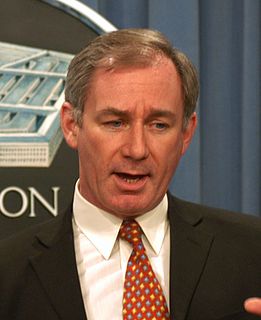A Quote by Rajiv Gandhi
I would like to clarify that our opposition to the Nuclear Non-Proliferation Treaty is not related to any consideration involving Pakistan. Our position on this important issue is consistent and principled. We are not ready to sign the NPT as it stands today because it is blatantly discriminatory in character.
Related Quotes
The basic problem with the Non-Proliferation Treaty is there's no teeth in it, no penalties for countries that don't comply. Worse, as you say, the very naïve structure of the NPT has actually made it helpful for countries who want to acquire nuclear weapons. Iraq, North Korea, Iran, all used the NPT to build up their nuclear programs.
If protesting against having a nuclear bomb implanted in my brain is anti-Hindu and anti-national, then I secede. I hereby declare myself an independent, mobile republic. I am a citizen of the earth. I own no territory. I have no flag. My policies are simple. I'm willing to sign any nuclear non-proliferation treaty or nuclear test ban treaty that's going. Immigrants are welcome. You can help me design our flag.
We have been led to believe that we have come a long way toward world nuclear disarmament. But that is not the case. Our government is not doing all that it could. We must urge our leaders to fulfill the obligations of the Nuclear Non-Proliferation Treaty. The United States must assume world leadership to end once and for all the threat of nuclear war. It is our moral responsibility.
The real issue of dealing with proliferation of weapons of mass destruction: nuclear, chemical or biological is: What is your tolerance for risk? And my tolerance for risk for WMD proliferation is pretty close to zero. Because otherwise, we and our allies are at the mercy of regimes like Ahmadinejad and the mullahs in Tehran, or Kim Jong Il and the Hitler-in-the-bunker mentality in Pyongyang, or others who don't share our calculus on the value of human life.
For the United States to recommit itself to the obligation that we undertook in the Nuclear Non-Proliferation Treaty that many other states undertook, which was to work towards disarmament and the eventual elimination of nuclear weapons, is something that manifestly serves our national security interests.
One of the most serious [challenges] is increased military spending and the cost of maintaining and developing nuclear arsenals. Enormous resources are being consumed for these purposes, when they could be spent on the development of peoples, especially those who are poorest. For this reason I firmly hope that, during the Nuclear Non-Proliferation Treaty Review Conference to be held this May in New York, concrete decisions will be made towards progressive disarmament, with a view to freeing our planet from nuclear arms
the IAEA illegally insisted on politicizing the Iranian nation's nuclear case, but today, because of the resistance of the Iranian nation, the issue is back to the agency. And I officially announced that, in our opinion, the nuclear issue of Iran is now closed and has turned into an ordinary agency matter.









































